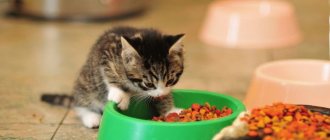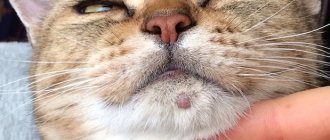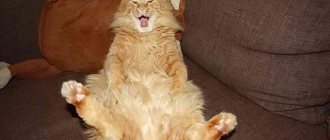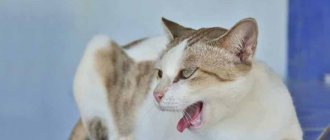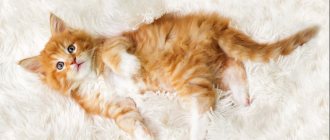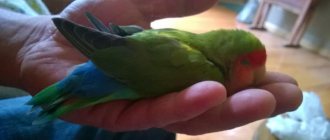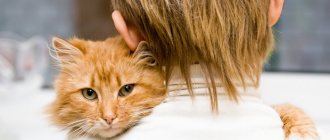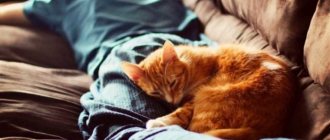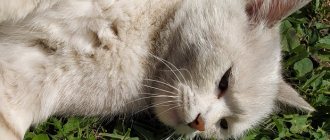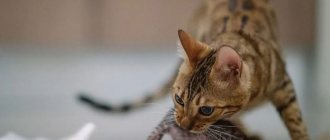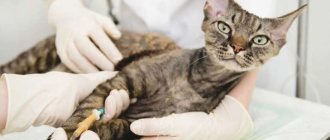7144Pavel
3
A phenomenon that is perceived from people with hostility, misunderstanding, and sometimes with concern for their health, is perceived with affection from cute pets. When a cat farts, we even want to laugh. But why does a cat fart? Perhaps there is no reason to laugh, but is this a warning to us, the owners, that the animal is not in good health? Or is the problem not so serious that you need to worry about it? Let's look at the reasons why a cat farts. And we will understand how to act and what the cat needs.
Do they fart or not?
Owners often have a question: “Can cats fart?” Cats fart, and this is a completely normal process of life. However, this happens very rarely. If your cat farts too often, you should pay attention to your pet's health.
During the digestion of food, gases are formed in the cat's intestines. Gases can also form in the stomach due to the action of carbohydrates. Unlike dogs, cats can form a sufficient amount of carbohydrates themselves. Therefore, their increased content in food can cause increased gas formation in the cat’s stomach.
Do cats fart?
Increased gas formation occurs as a result of fermentation of food residues in the body. The deviation is caused by the formation of large gas bubbles, difficulties with moving the food bolus, intestinal colic, and an unpleasant odor when cleaning the intestines. Cats fart because the food they eat goes through a complete processing process in the gastrointestinal tract.
Confused cat who got rid of accumulated gases
How to tell if a cat is farting
With flatulence, the animal experiences rumbling sounds in the abdomen; palpation examination shows an increase in the intestinal volume, moderate pain when touched. The pet can sleep peacefully, but when the accumulated gases escape, it suddenly wakes up, jumps on its paws, and meows.
The pathology provokes the development of diarrhea and constant anxiety in the furry pet. If a cat farts, then the problem is related to the inability to fully process the food it eats. Flatulence indicates an incorrect diet or the formation of gastrointestinal diseases.
Why does a cat fart?
A phenomenon that is perceived from people with hostility, misunderstanding, and sometimes with concern for their health, is perceived with affection from cute pets. When a cat farts, we even want to laugh. But why does a cat fart? Perhaps there is no reason to laugh, but is this a warning to us, the owners, that the animal is not in good health? Or is the problem not so serious that you need to worry about it? Let's look at the reasons why a cat farts. And we will understand how to act and what the cat needs.
Preventing flatulence in cats
In order to prevent the development of flatulence in cats, of course, it is necessary to monitor their diet (look here for recommendations on the best way to feed your cat), completely eliminating prohibited foods that provoke the development of flatulence. Also, it is worth taking care of a gentle diet for old animals and reducing the total amount of carbohydrates in their diet.
Herbal medicine has also proven itself well when it comes to the prevention of flatulence in cats - teach your pet to drink dill water, an infusion of chamomile or mint, cumin or fennel and the problems of flatulence will not be a problem for you.
Video tips on proper nutrition for cats
Today we talked about flatulence in cats, its symptoms, what can cause flatulence in an animal, and how to deal with this problem. We also looked at available preventive measures that can prevent the development of flatulence in your pets. We hope that our advice and recommendations will help you keep your cat healthy.
Have you ever encountered flatulence in your cat? What preventive measures do you take to avoid such a violation? Share your stories and experiences with us - we look forward to your comments.
Danger of flatulence
Bloating, excessive formation and accumulation of gases can cause flatulence. If a cat hiccups, farts, or belches, we can conclude that there is a malfunction in the digestive system. Due to flatulence, a cat may begin to vomit, diarrhea, cramps, and the abdominal wall may be deformed, which is very dangerous for the animal’s body.
If a cat with such problems continues to eat food, this leads to its incomplete digestion. Food gets stuck in the intestines and begins to rot. The result of this may be intoxication of the animal's body. If your cat's farts smell rotten, this is an important reason to immediately contact a veterinarian.
Reasons why a cat develops gas in the intestines
In fact, there may be several reasons for a cat to start farting. Most of them are harmless, and all cats fart sooner or later, this needs to be taken into account. And, if you hear your pet releasing air from its intestines for the first time, don’t be alarmed. But there are also more serious reasons for concern. Surprisingly, sometimes it’s not a matter of injury or intestinal disease, but a person’s mishandling of his beloved pet. That’s why it’s worth looking into the problem more seriously.
Possible causes of flatulence in a cat:
- Improper feeding;
- Constipation;
- Infections, bacteria, viruses in the intestines;
- Dysbacteriosis;
- Allergy.
Of course, these are not all the reasons, but it is worth talking about each of them separately. And yet, if a cat farts once, this is not a reason for concern. But the picture is worth starting to observe and probe.
Incorrect feeding. Cats are inherently predators. And it is protein foods that are important for their health, and then fats and amino acids. The amount of carbohydrates required for brain activity is produced by the cat’s body itself. Owners sometimes give their cats whatever they ask for. As a result, the cat receives a lot of carbon, which ferments, gases accumulate in the intestines, and it farts. It’s easy to solve this issue by simply reconsidering your attitude towards your cat’s diet.
If we continue the topic of nutrition, we can also name another reason why a cat farts - this is how much the cat has eaten. Excessive amounts of food cause the cat’s body to be unable to digest it. Food that is not digested rots and the cat begins to fart.
And one moment. Wanting to do everything right, pet owners decide to purchase cat food. But it is worth considering that not every food is suitable for a particular cat and what is currently happening in its life. She may have an injury or lactation. All this should be taken into account and first consult with a specialist.
Constipation. We have already said a little about the causes of constipation; it is an excessive amount of food . But it can also be injuries to organs or bones, which is why the intestines do not function normally. There are other reasons for constipation. In this case, you can hear the cat farting constantly, perhaps even the smell of its gases, which it releases from the intestines, is quite unpleasant, putrid.
Infections, bacteria, viruses are to blame for digestive disorders in cats. And hence the reasons for farting. Diarrhea or vomiting can often be signs of infection. The viral disease parvovirus affects intestinal cells, infects it and prevents cell division. Because of this, the intestines practically cannot digest food, against this background diarrhea, dehydration and intoxication develop.
Dysbacteriosis. We all know well the consequences of infectious diseases. We solved an important issue, cured the infection with antibiotics, but at the same time killed the bacteria involved in food digestion. The same thing can happen with cats. Therefore, it is worth taking care to check the intestinal microflora after any treatment for the presence of beneficial bacteria in the required quantity.
Allergy. It affects all the internal organs of the cat, including the digestive system to varying degrees, from the fact that the cat begins to fart to complex forms of the disease.
Based on the reason for the cat's farting, the owners should decide what to do to help the pet.
When to go to the vet
If your cat farts frequently and there is an unpleasant odor from the gases, then this is a good reason to visit the veterinary clinic. Self-medication in this case will do more harm than good. Without diagnostics and tests, it is difficult to determine the source of dysfunction and select medications.
Veterinarians advise not to ignore flatulence in pets: it is better to be safe than to carry out long-term therapy for a sick pet. If a cat farts once, then this is a normal reaction of her body; with prolonged gas formation, professional help is needed.
How does flatulence manifest?
Gases released from the intestines do not always have unpleasant odors; for this reason, owners simply do not notice problems with the animal’s digestion. And then the existing problems remind themselves of themselves with rumbling and pain in the stomach, because of which the cat becomes restless, its stomach increases in size, and diarrhea and vomiting begin.
These symptoms force the owners to take the cat to the veterinarian so that he can establish an accurate diagnosis and prescribe treatment. If this is necessary, you will have to do stool, blood and urine tests, perform an x-ray and ultrasound of the abdominal cavity.
The structure of the digestive system
The digestive system of cats consists of the oral cavity, pharynx, stomach, small and large intestines. The pancreas, duodenum and gallbladder also take part in the digestion process.
An adult cat has 30 teeth in its mouth. The tongue is covered with small, rough papillae, thanks to which the cat can lap up all sorts of liquids. Thanks to saliva, the digestion process begins in the oral cavity. Next, the cat pushes food into the esophagus, which can stretch if necessary.
The food then enters the stomach, where it is digested with the help of gastric juice. From the stomach, food enters the small intestine, where it is finally digested with the help of a pancreatic enzyme.
The processed compressed waste is excreted through the large intestine. It also serves to form beneficial microorganisms and bacteria.
Causes of gas accumulation
Any gas formation is the result of fermentation. Most often, cats fart due to a violation of their diet, when a large amount of carbohydrates enters the body. The cat practically does not need them: in the small intestine, carbohydrates are broken down into glucose, which is necessary only for brain function. Excess carbohydrates cause bloating: excess gas is released either when the cat farts or when he burps. The remains of carbohydrate-rich food accumulate in the abdominal cavity and begin to rot there, which entails pathological changes in the functioning of the entire animal’s body.
The second reason for the accumulation of gases is the presence of intestinal parasites. Helminths live in the small intestine, irritating its walls and causing general allergies in the body. In large concentrations, intestinal parasites can cause blockage of the intestines and bile ducts. If a cat is infected with worms, it will not only fart frequently, but also suffer from constipation.
The third reason is the swallowing of excess air when quickly eating food. In this case, the cat will more often burp than flatulence. It is enough to reduce the portions and increase the frequency of feeding, and the cat will stop spoiling the air.
Features of the stomach
A cat's stomach is single-chamber. The inside is lined with a mucous membrane that produces gastric juice. There are two openings from the stomach: one opens into the esophagus, and the other opens into the small intestine.
The cat's stomach serves to store food and control the rate at which food enters the intestines and secretes enzymes necessary for the digestion process. Mixing and grinding of food occurs in it. With muscle movements, it directs food into the small intestine.
When food enters the stomach, its bottom relaxes to reduce intragastric pressure. The smell and taste of food causes the secretion of gastric juice. Digested food is sent to the intestines, and its undigested part remains in the stomach. The more caloric a food is, the slower it is digested.
Possible causes of flatulence
If you are wondering “do cats fart”, then you are probably interested in the reason for this phenomenon. The reason for the increased formation of gases in the stomach can be a sudden transition of the animal to another food. It is worth remembering that if an animal eats one type of dry food, then abruptly switching it to another can be very harmful to the body. New food should be introduced into the diet gradually so that the body gets used to it.
Another reason may be swallowing air while eating. This is due to the fact that the cat's bowl is too low or high, which is why the animal is forced to take an uncomfortable position while eating. Rapid absorption of food can also lead to swallowing air: this is typical for kittens and young individuals.
The increased content of carbohydrates in food is one of the main reasons for the formation of gases in the stomach. Flatulence is also possible as a result of an allergic reaction to some food component. Very allergenic are cheap foods that contain a large number of various chemical additives that cause addiction in the animal.
Increased gas formation can be caused by inflammatory processes in the stomach and intestines. Congenital pathologies or injuries received during life can disrupt the functioning of the digestive system.
A common cause of flatulence in street animals is viral infection. Another reason for increased gas formation can be dysbacteriosis. A change in the number of microorganisms in the stomach can occur after an animal takes antibiotics or due to inflammatory processes in the body.
Treatment of flatulence
It is possible to treat bloating in a cat without involving a veterinarian only if there is simple flatulence in which there is no manifestation of any other disease. In other cases, an immediate visit to a veterinary clinic is necessary. Answering the question of what to do if a cat’s stomach is swollen, we can advise the following:
- Hilak Forte - Give 1 drop per 1 kg of weight once a day, until complete recovery;
- Smecta;
- Enterosgel;
- Children's espumesan.
A bloated belly in a cat is a dangerous condition and its cause must be identified. This is often a symptom of a serious injury. The problem should be resolved with the involvement of a veterinarian. If the cat begins to bloat before our eyes, and there is no urinary retention, it is necessary to give medication for allergies, since this is most likely it. As soon as the attack subsides, the size of the abdomen will return back, and everything will be normal.
Flatulence in cats is an excess of the normal amount of gas in the stomach or intestines. Flatulence is more common in dogs than in cats, but in cats it is usually related to their diet, or when they swallow air while eating, when they eat too much or too quickly, or when the animal has an upset stomach, colon, or small intestine. .
A small amount of gas is natural in cats' digestion and it usually goes away quickly. However, excessive gas or flatulence, especially if it smells bad and is accompanied by other symptoms, may indicate problems in your cat's digestive system.
Owners sometimes don’t even know if a cat is farting, because unlike humans, animals do it very quietly. Flatulence in cats becomes obvious with the appearance of a foul odor.
The first measure is to change the diet, even if the cat eats only special food. You will have to experiment to find out what causes the accumulation of gases in the animal. To prevent your cat from swallowing excess air, it is recommended to soak ready-made dry food first.
If an unpleasant odor appears during the release of gases, the animal should be shown to a veterinarian. If the doctor diagnoses “dysbacteriosis”, then probiotics will be needed, most often Lactoferon. Together with them, you will need to help the body get rid of toxins by giving activated charcoal or Atoxil. Smecta will help eliminate irritation of the intestinal walls, and Espumisan will help reduce gas formation. Kittens can be fed with dill water.
Food allergies and intolerances to certain foods are treated with antihistamines. In severe cases, the cat will be prescribed antibiotics. If gas formation is associated with pathology of internal organs (with intestinal obstruction), surgery is performed.
We suggest you read: Duodenitis in cats causes, diagnosis, treatment
What causes increased gas formation?
The following reasons will tell you why a cat farts and why the intestines do not function normally:
- Individual intolerance. Allergies are associated with a negative reaction of the body to certain foods. Most often these are gluten, milk sugar, and artificial ingredients in dry and liquid food. A striking example is budget food. Cheap formulations add elements that cause addiction in the animal, which then farts, suffers from gas and colic.
- Constipation. If a pet cannot empty its intestines or fart, this will inevitably lead to gas formation and other processes that cause discomfort to the cat.
- Limitation of intestinal functions. The pathology of the inability of the intestines to process food is most often a congenital problem. Other factors include injury or previous stomach illnesses. An accurate diagnosis can only be made with long-term observation by a doctor.
- Dysbacteriosis. For normal functioning, the stomach and intestines will need positive microorganisms. Their deficiency leads to decreased immunity and problems with flatulence, when the animal farts constantly. Bacteria are destroyed due to active use of antibiotics or through toxicity.
- Viral infection. If a cat goes outside and does this more than once a day, catching the virus is easier than ever. The most common is parvovirus, found in every second street reveler, for whom farting becomes the norm.
- Inflammatory process. Diarrhea, vomiting, and bad breath will help identify the presence of inflammation. Flatulence in such diseases is a side effect, signaling that it is time for your pet to see a veterinarian.
In addition to diseases, you should also know about the natural reasons why a cat farts a lot.
© shutterstock
Firstly, this is an increased amount of carbohydrates in the body. According to regulations, food for adults should not contain more than 15% carbohydrate particles. Moreover, it is better if these are so-called fast carbohydrates, the digestion and processing of which will not cause problems in the intestines and will not lead to farting.
Secondly, we must not forget about the rules for organizing a place to eat for a cat. When the bowl is too low or high, the cat is forced into an awkward position. This leads to air entering the stomach and natural gas formation, farting. If an animal farts and constantly faces such problems, there is a high risk of critical disruption of digestive processes.
Those who skimp on pet food face this problem more often. The cat farts very often, which is a consequence of exposure to artificial ingredients and flavoring additives that negatively affect the stomach, intestines and the body as a whole. Branded formulations are prepared from natural meat and include the entire vitamin complex aimed at strengthening the immune system.
According to doctors' studies, the main reason that a furry animal farts is swallowing air. Diseases and poor quality of feed take second place. But flatulence is always an individual indicator, although in a healthy cat gases pass out within two hours after eating and in most cases unnoticed by others.
Can cats fart: why do cats produce gas?
Veterinarians confirm that cats, like their owners, are not immune to flatulence. This is what doctors call excessive accumulation of gases in the intestines. The strength and frequency of gas discharge is affected by:
- the amount of carbohydrates absorbed by the cat from food;
- organizing a place where the pet eats;
- quality of the selected feed.
Scientists have proven that a cat can fart constantly because of its haste - the desire to quickly empty the plate. At the same time, young individuals suffer from flatulence more often. If kittens eat quickly, you can throw a small ball into a plate of food. This way the pet will have to constantly move its nose, distracting itself from food.
Nutrition and eating habits
Cheap food contains many additives that are harmful to the animal, which negatively affect the functioning of its digestive system.
Fast carbohydrates are well absorbed and do not cause problems.
However, such food should not be more than 15%. It is unacceptable to choose cheap food that contains an abundance of flavorings and dyes. Such artificial components irritate the intestines and stomach, which causes flatulence and other problems with the body. Natural food contains meat, vitamins and ingredients that enhance immunity. It is equally important to provide the kitten with proper access to the bowl. The plate should not be high or very low. Otherwise, the animal will swallow air along with food, which, if repeated regularly, will lead to irreversible disturbances in the cat’s gastrointestinal tract. Foods that cause farts
| Name | Peculiarities | To give or not |
| Fermented milk | Cats fart not from variety or order, but from excess | Up to 3 times a week is possible |
| Soybeans, corn, wheat | Irritates the stomach, triggers the fermentation process | Depends on the initial quantity in the composition |
| Used in feed as a source of protein | ||
| Garlic | Has antihelminthic properties | Forbidden |
| Seriously harmful to the health of the animal | ||
| Fat trimmings | Chicken, beef, fish | Only as a rare supplement |
| bread yeast | Start fermentation processes | Prohibited, especially if the products are spoiled |
| Any food from the table | Rough, unprocessed food, which is dangerous for many purebred animals, such as the Maine Coon |
Physiology or age characteristics
Elderly animals should buy food according to their age to avoid problems with their digestion.
Cats often fart when they are old or young. Young animals simply have an unhardened digestive system, while old pets, on the contrary, may have problems with enzymes that ensure normal breakdown of food. If the stomach is weak, any food is poorly accepted, so veterinarians recommend specialized foods adapted to the age characteristics of the animals.
When is the problem pathological?
In addition to the harmless and easily corrected ones, experts identify dangerous causes of flatulence. These include:
- Individual intolerance or allergy. The disease can arise due to initially incorrectly selected food - too cheap, low-quality, high in gluten, milk sugar.
- Constipation. Often happens due to insufficient fluid, unbalanced nutrition. At the same time, the cat eats a lot, but cannot empty its intestines. This leads to increased gas formation, pain and constipation.
- Congenital anomalies of intestinal development or acquired problems associated with injuries, surgeries and stomach diseases. In these cases, the organ does not perform its functions, food is not digested, and gases with an unpleasant odor are released.
- Dysbacteriosis. With a lack of enzymes for processing food, local immunity decreases, the cat farts constantly, and diarrhea develops. This often occurs after treatment with antibiotics.
- Viruses. The problem is especially common in cats that walk outside. Infection with paraviruses leads to the fact that animals are able to constantly pass gas.
- Inflammation. Flatulence is a sign of the need to urgently consult a doctor. Accompanied by diarrhea, vomiting, bad breath.
This is interesting: Decoding blood tests in cats
What to do if a cat farts?
First of all, it is necessary to properly arrange the place for eating. The animal should have a relaxed posture while eating: do not pull its head too low or high, do not throw it to the side.
It is worth taking care of proper nutrition for your pet. Cheap food can be addictive in cats, and they also contain strong allergens. Problems can also arise when feeding an animal with natural food, because under no circumstances should you simply feed a cat fish or cutlets from the table. Natural food must be properly balanced.
If the above measures do not change the situation, and the cat still farts often, you should take him to the veterinarian. Don’t forget that timely measures can save your pet’s life.
Changing your diet
Why does a cat lick a person: the main reasons and what it means
Improper feeding is one of the main sources of indigestion and gas in a cat. A lack or excess amount of food, an incorrectly selected diet, and eating waste from the master’s table provoke gastrointestinal dysfunction. Mature pets are in a subgroup at increased risk for the disease, and their weakened bodies require a sufficient supply of vitamins and minerals.
Note! Good expensive food has a high price, but does not harm animals. They are categorized by age, activity level and body weight. They cannot overfeed or underfeed your furry pet.
Why are cheap options not suitable? They have added foreign components - legumes, soybeans, corn. For a carnivorous predator, they are foreign and are poorly digested in the gastrointestinal tract. Artificial flavor enhancers and other flavorings become a favorable source of proliferation of pathogenic microflora.
You cannot buy food according to your pet’s taste preferences. If earlier he avoided foods that were dangerous to health, now manufacturers manage to lull his vigilance with third-party additives. Inexpensive food is made from components that attract attention and interest the animal. The result of saving is a storm in the stomach due to active fermentation.
Manufacturers of branded mixtures indicate on the packaging the constituent ingredients: proteins, a mixture of poultry, beef, rabbit and other animals, vegetable fats. They do not contain soy, corn and other components that increase the weight of the feed.
Does my cat pass gas after feeding? They can be caused by disruption of the feeding schedule. Three meals a day are allowed; the best option is morning breakfast and evening dinner. If an animal has access to food all day, overeating results in flatulence and other unpleasant symptoms.
Important! A hungry pet is not able to patiently wait for the time when a careless owner remembers his responsibilities. He starts looking for food in trash cans, on the table, and tries to escape into the street. This behavior is not the result of curiosity, but a problem that leads to serious illness.
Hungry cats often look in the trash
Clinical picture
Of course, when a cat constantly passes gas, the diagnosis is quite simple. But it’s still worth remembering that there are other clinical signs that directly indicate flatulence:
- Vomit.
- Diarrhea or constipation.
- Rumbling in the stomach, also known as borborygmy. Occurs when intestinal gas bubbles begin to “roll” in the intestines.
- Copious release of gases through the anus. Sometimes the smell is so strong that it is impossible to be in the same room with the animal.
- Muscle spasms causing severe pain. It is impossible to touch the stomach of a sick cat, since the animal reacts to such attempts very inadequately and aggressively.
In addition, the stomach of a sick pet noticeably swells and feels like a drum . The muscles become very tense. The cat cannot lie or sit quietly, constantly fidgets, and sometimes howls in pain. A pet in this state refuses food, and thirst may persist.
How to determine that the problem is pathological
To identify serious pathologies, you need to pay attention to the following signs:
- Diarrhea. If copious release of gases is accompanied by severe diarrhea, then this almost always indicates an infection or bacteria. They can enter the body with food. It is better to immediately contact the clinic, and then the doctor will quickly make a diagnosis.
- Vomit. Most often, vomiting occurs due to helminthic infestation. Infection with parasites is especially dangerous for kittens, especially those under 3 months of age.
- Constipation. This sign indicates a serious pathology. If the animal also stops eating and drinking, you should immediately contact a veterinarian. Such constipation can only be eliminated in a specialized clinic; if this is not done, the cat may die.
We suggest you familiarize yourself with: Inflammation of the third eyelid, types of causes, first aid and treatment
Statistics indicate that most often those cat owners who feed their pets dry food go to the veterinary clinic. Therefore, we advise you to switch to wet food or canned food, as it is healthier for cats. All the best!
Veterinarian advice
Veterinarians have concluded that the most common reason cats fart is swallowing air when eating. The second most important reason is poor quality feed. Economy-segment food is now widely available on the market, and many owners feed it to their pets, thereby causing severe harm to the body. Low-quality food is especially harmful for kittens: the animal’s body is not yet formed and it is very important that it receives all the necessary nutrients and vitamins.
It is worth noting that various diseases are also a common cause of flatulence, which only a veterinarian can identify. You shouldn’t leave things to chance if you have doubts about your pet’s well-being.
At the appointment, the veterinarian must do an external examination and palpate the abdomen. The animal's blood should be taken for tests. An x-ray or ultrasound may also be needed. It is these actions that can help determine the cause of flatulence and take the necessary measures in time.
Physical exercise
The health of not only humans, but also their pets depends on physical activity. Veterinarians recommend visiting a pet store and purchasing special devices that help cats diversify their dull pastime indoors.
The climbing structure is safe; individual models can be rebuilt according to the principle of a children's construction set. It will keep your pet occupied for many hours, will increase its agility, strength, and relieve excess weight.
Toys - mice, balls, bags of catnip - will allow the animal to realize its hunting instincts. Chasing the elusive ball will arouse interest and improve the functioning of internal organs. You should not purchase toys from dubious places; toys made from toxic substances or poorly processed with sharp seams can cause serious damage to health.
Every cat should have its own toys
Important! In the absence of free material resources, you can use tennis balls, golf balls, and ping pong balls as a simulator. The owner must be able to determine the appropriate size devices: the cat can swallow toys that are too small, or they will accidentally fall into the windpipe.
Causes, symptoms and diagnosis
Having noticed that flatulence constantly bothers your cat, you should not go to extremes, come up with terrible diagnoses, and even less self-medicate. Let’s immediately say that flatulence can occur for hundreds of reasons; we will give the most common ones. So, increased gas production can be associated with a number of ailments or abnormalities in the body’s functioning:
- Constipation - a cat cannot empty its intestines in a timely manner for some reason.
- Allergies or individual intolerances – cats may be intolerant to certain substances, such as milk sugar or gluten. Against the background of immunity, a four-legged animal can happily consume harmful foods, and then suffer from gases.
- The inability of the intestines to properly digest food can be due to a number of reasons, from paresis and insufficient peristalsis to metabolic disorders. Such a problem can only be identified by long-term monitoring of the condition of the cat.
- Dysbacteriosis is a condition caused by an insufficient number of beneficial bacteria in the intestines of an animal. Friendly microorganisms may be destroyed by antibiotic treatment or replaced by other microorganisms.
- Intestinal inflammation is infectious or bacterial - typical signs: diarrhea, vomiting, frequent belching, bad breath.
- Intestinal viruses, such as parvovirus.
- New growths in the intestines, including benign ones.
- Other diseases of the gastrointestinal tract.
In addition to illness, flatulence can be associated with aspects of care. After analyzing the points below, you will understand why a cat farts:
- A diet high in carbohydrates - the cat’s menu should contain fast carbohydrates, but according to generally accepted rules, no more than 13-20% of the total food (for adult cats).
- Incorrect body position while eating food or water - when the bowl is low and uncomfortable and the cat has to take an unnatural position while eating, this leads to swallowing air. A similar situation occurs if the bowl slides on the floor while eating. A small amount of swallowed air is released in the form of belching. If a cat constantly swallows air, this leads to poor digestion and the development of severe flatulence.
The volume of accumulated gases is a very individual indicator. In some cats, flatulence is almost unnoticeable (gases pass for up to 2 hours), while for others it brings noticeable inconvenience: vomiting, diarrhea, severe gurgling in the intestines and, as a result, cramps. It has been established that the main factor in the development of flatulence is swallowing air, followed by swallowing food too quickly.
The problem of swallowing air can be solved relatively easily - purchase a non-slip mat or stand for the bowl. It is more difficult to fight flatulence if it is caused by the fermentation process. If you suspect that the cause of gas accumulation is insufficient quality care, you will find instructions for action in the next section.
If everything is fine with your diet and you are sure of it, you need to go to the clinic and conduct a series of examinations:
- Examination of the cat and palpation of the peritoneum.
- Complete blood test, including kidney and liver parameters.
- Urine and stool analysis.
- Ultrasound and, if necessary, X-ray examination of the abdominal cavity with contrast.
Before contacting the clinic, we recommend that you take a detailed history of the animal. Try to write down in detail everything related to the daily routine, diet, activity and characteristics of caring for your pet. Long-haired cats may suffer from hair clumping in the stomach, if you did not give your ward any preventive medications, this should be indicated in the anamnesis.
Bloating in a cat due to flatulence
So that you have no doubt that your cat really has flatulence and not some other disease, we suggest that you familiarize yourself with the characteristic symptoms of this disorder. So, the cat behaves restlessly, meows pitifully and tries to attract your attention, or, on the contrary, hides in a dark corner and sits there, showing no signs of life.
Flatulence in cats - its causes and treatment
If, after analyzing the symptoms and diet of your pet, you realize that there is every reason for the development of flatulence, you should not wait until the situation becomes critical - the animal should be shown to a veterinarian for first aid. If it is not possible to show the animal to a specialist, you will have to provide first aid yourself.
So, in order to relieve spasms in the stomach and intestines, you will need to give the cat an anesthetic - traumeel, baralgin or antipyrine, the dosage depends on the animal’s body weight and its age. Afterwards, in order to remove gases, the cat will need to be given an activated carbon tablet or polysorb diluted in water. After a few hours, you will be able to give a cleansing enema.
In order to increase the processes of salivation and belching - in this situation they help eliminate intestinal bloating, you can carefully insert a wooden stick, which is lubricated with salt or ichthyol, into the cat's mouth and secure it with a bandage on the back of the animal's head.
If you prefer to use homeopathic remedies to treat your four-legged friend, you can try the drugs Nux vomica Homaccord or Engistol - they have proven themselves in the treatment of flatulence and intestinal disorders. They can be used both in the form of mixed injections and alternating them.
READ Why does a calf grind its teeth? Why does a cat grind its teeth and seem to be chewing something: why is this?
Do cats have flatulence?
Your affectionate pet is curled up in your arms, by the way, in the body language of cats - this is a signal of trust and disposition towards you (find out here about other interpretations of cat body movements that will help owners better understand their pet), and you are in a similar relaxed state state, when suddenly your idyll is disturbed by an unpleasant fetid smell. Where could it come from?
This often happens when cats have flatulence, and about the reasons for this phenomenon, about foods that can cause flatulence in cats, and of course about how to treat and prevent excess accumulation of gases and their release with a terrible odor - we talk about all this Today we will talk in our new article...
What is flatulence
If we turn to veterinary and human medical reference books, for comparison, flatulence is the process of bloating in an animal as a result of the accumulation of gases in the intestines.
This can not be seen often, despite the fact that the release of gases for the body of animals is a completely natural process, but sometimes you can still observe an excessive accumulation of gases and their release with a terrible odor.
There are no age limits for such a disorder, but still, most often, flatulence is observed both in small kittens if they have a helminthic infestation, and in old animals whose metabolic processes in the body are disrupted as a result of old age - find out how a cat’s body ages and about the duration of her life.
Increased gas formation occurs due to errors in the cat’s diet. You need to feed your kitten fresh food in small portions. Spices, bread, and milk should be removed from the diet. It is imperative to feed your pet meat, but not chicken skin or fat.
If gas formation is frequent and causes discomfort to the animal, you need to give enterosorbent in a child's dosage or simethicone preparations (espumisan, simethicone). After this, take the cat to the veterinarian to rule out the possibility of a serious pathology of the food system.
Antibiotics, anthelmintics, or antimycotics may be prescribed as therapy. If ulcers are found in the intestines, surgery is performed. In mild cases, the specialist prescribes drugs that regulate microflora and carminatives. In some situations, a gas tube may be inserted.
How to choose the right food?
A very common cause of flatulence is improperly selected food. Do not forget that a cat is not a person, and therefore you should not feed it from your table. The cat's food must be properly balanced and contain the required amount of vitamins and minerals. Premium species can boast of a good composition.
Cheap economy-class food most often does not contain normal meat, but includes by-products (production waste). In addition, they contain additives that are addictive.
If you decide to feed your cat natural food, you need to consult a veterinarian to create a properly balanced diet. It is worth remembering that a cat's diet should contain 35% protein, 35% carbohydrates and 30% fat. Cat food must contain meat and meat by-products, grains and vegetables. All this should be boiled and minced through a meat grinder into a homogeneous mass. You should use fish carefully, because its excess in the diet can cause urolithiasis, especially in sterilized animals.
Thus, the answer to the question “do cats fart” is clear: yes, they fart. And this is a completely normal process. However, do not forget that if a cat farts frequently, this is a good reason to consult a doctor.
Main causes of gas
Why do cats sleep a lot: the main reasons and is it normal?
Cats fart for a reason; the problem is caused by improper feeding, accumulation of hair in the gastrointestinal tract, helminths and other sources. When a pathology appears, the owner needs to check why the cat is experiencing flatulence.
Dangerous foods for pets
Poor nutrition
Most often, a cat repeatedly spoils the air due to an incorrectly selected diet containing large amounts of carbohydrates. Food enriched with them lingers in the intestinal tract and begins to rot, causing poisoning. Feeding from a common table leads to the fact that animals begin to fart constantly.
Important! Many careless owners sincerely believe that spoiled food does not harm the cat’s body. Rotten feed irritates the mucous membranes of the gastrointestinal tract, causing intoxication, vomiting, diarrhea and flatulence.
Cats love milk, but the effects on their stomach after drinking it are not very pleasant.
Veterinarians have compiled a list of reasons why cats fart.
- Bakery products. Feeding pieces of a bun or cake leads to fermentation processes in the intestinal tract. Yeast and carbohydrates are harmful to pets; constant feeding with sweet buns over time provokes inflammatory processes in the gastrointestinal tract.
- Milk products. The usefulness of milk, sour cream and kefir for adult animals is questionable. The body of a mature individual does not produce special enzymes that help digest these products. Active feeding with dairy and fermented milk products becomes a source of lactose intolerance. One saucer of milk sometimes leads to prolonged, two-month therapy for the affected animal.
- Fish products. The second common misconception is the recommendation to constantly feed fish. The carnivorous nature of cats requires meat, and fish products are allowed on the menu no more than once a week. An excess can lead to the formation of kidney stones, especially in males, digestive disorders, and increased gas formation.
- Spices. Spices, garlic and onions are among the enemies of the gastrointestinal tract of furry pets. They cause gastritis, colitis and other inflammatory phenomena of the gastrointestinal mucosa. The misconception about the benefits of spicy vegetables in the fight against worms and colds comes from rural areas, where these pathologies predominate among the population.
- Fat and meat trimmings. Attempts to feed the animal with cartilage, fat and fascia are successful. The predominance of these “delicacies” causes indigestion, problems with liver function, flatulence, and diarrhea. Constant feeding of junk food will result in chronic diseases of the digestive system.
- Cereals. The omnivorous nature of cats is one of the common myths. The unfortunate hungry animal is forced to eat the soy, wheat and corn products offered. They are a source of increased gas formation and disturbances in the gastrointestinal tract.
Do domestic cats fart on expired food? Spoiled food and meat with a characteristic odor initially cause flatulence. The consequences of such a diet include intoxication, serious diseases, and helminths.
Balls of wool
Ignoring the need for constant care for pets, especially long-haired breeds, leads to the accumulation of hairballs in the intestinal tract. They interfere with the digestive processes, leading to stagnation of the food bolus, its rotting and fermentation. Not all individuals have a well-developed gag reflex, which allows them to regurgitate trichobezoars - dense balls of compressed hair that stretch the intestines, causing diarrhea, vomiting, and flatulence.
Vomiting in a cat is a sign of many ailments
Intestinal parasites
If your cat farts repeatedly, the problem may be intestinal parasites. Worms are localized in the small intestine and cause irritation of its mucous membranes and allergic reactions. A large accumulation of helminths leads to blockage of the lumen of the gastrointestinal tract and bile ducts. With parasites, a cat experiences not only increased gas formation, but also constipation.
But there are other sources of flatulence.
- Allergic reactions. Individual intolerance to certain foods causes allergy outbreaks. Pathology is associated with a variety of products, but more often it occurs due to milk sugars, gluten, and artificial components in finished feeds. Cheap varieties contain ingredients that make the animal want to eat them constantly. As a result, it suffers from gas, colic, and pain in the gastrointestinal tract.
- Viruses. Infection occurs through constant visiting of the street. Domestic animals are less likely to become ill with parvovirus compared to free-roaming animals. Average statistical data indicate that every second cat suffers from it due to contact with the outside world.
- Inflammation. The development of pathology is determined by diarrhea, bouts of vomiting, and bad breath. Severe gas formation during the inflammatory process is a secondary symptom. A sick pet requires a visit to the veterinarian and antibiotic treatment.
- Dysbacteriosis. Disturbance of the balance of normal microflora is associated with antibiotic therapy, poor nutrition and subsequent intoxication. The disease provokes disruption of the immune system and flatulence. Do small kittens fart when they have dysbacteriosis? In young animals, the disease is caused by transferring to roughage after mother's milk, from wet to dry food.
- Constipation. A prolonged delay in defecation provokes increased gas formation. An overfilled gastrointestinal tract irritates the pet, and constant discomfort leads to loin riding on the floor and meowing plaintively.
- Impaired functionality of the intestinal system. Pathological inability to process food normally is more common in cats with congenital abnormalities. Other causes of dysfunction include injuries and previous gastrointestinal diseases. Only a veterinarian can determine the source of the disorder after a full diagnostic examination.
- Air entering the stomach. Eager consumption of food leads to belching and gas formation. Increasing the frequency of feeding and reducing the size of portions quickly solves the problem.
Important! If the pet spoils the air regularly, the owner should consult a veterinarian. In some pathologies, ignoring the symptoms can cost him not only his health, but also his life.
WHY
Scientists have discovered farting fish
If it seems strange that serious scientists in Scotland are publishing a study on herring farts, what about the fact that they were practically outdone by Swedish scientists who discovered the same phenomenon? This is what great minds do. Bob Batty of the Scottish Association of Ocean Sciences was quite surprised when, together with two researchers from Canada - Ben Wilson and Larry Dill - he made this discovery.
We suggest you read: Preventive rabies vaccination for pets. Rabies vaccines for cats and dogs.
